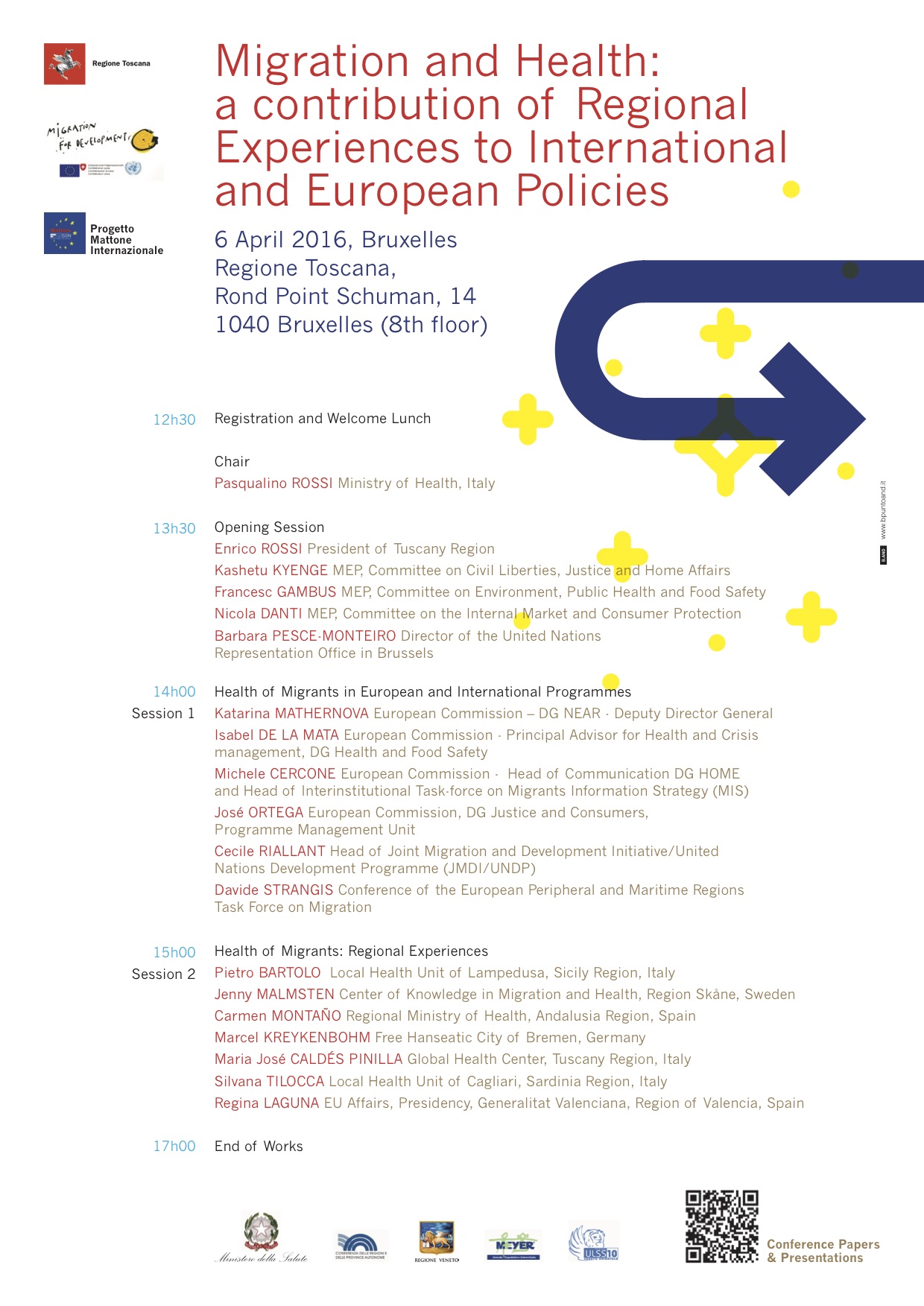
- 11Marzo
-
Migration and Health: a Contribution of Regional Experiences to International and EU Policies
6 APRILE 2016
Bruxelles
Regione Toscana
Rond Point Schuman, 14
1040 Bruxelles (8th floor)NEW!! Conference report EN
NUOVO!!Sintesi della Conferenza ITA
Presentations and good practice:
José ORTEGA, European Commission, DG Justice and Consumers, Programme Management Unit – Presentation
Davide STRANGIS, Conference of the European Peripheral and Maritime Regions – Task force on Migration –Presentation
Giacomo NEGROTTO, Joint Migration and Development Initiative /UNDP – Presentation
Jenny MALMSTEN, Skane Region, Sweden – Presentation and best practice
Marcel KREYKENBOHM, Free Hanseatic City if Bremen, Germany – Presentation and best practice
Carmen MONTANO, Andalusia Region, Spain – Presentation and best practice
Regina LAGUNA, Region of Valencia, Spain – Best practice
Silvana TILOCCA, Sardinia Region, Italy- Presentation and best practice En buone pratiche _ITA
Background
In the last decade, inequality, poverty and lack of opportunities together with growing instability in the Maghreb, Middle East and West Africa Sahel, have contributed to increased migration flows between the North and South Mediterranean and intensified irregular human mobility. The EU countries as a whole, and particularly countries closest to North Africa and the Middle East, face large influxes of migrants.
One aspect of migration that is attracting renewed attention is the impact that it has on public health. Migrants may be subject to multiple forms of discrimination, violence and exploitation, all of which often directly affect their physical and mental health. In addition, migrants may have health problems that are not well known or understood in their countries of destination. Aggravating this problem, legal and socioeconomic barriers impede access to health services in many cases; in cases where migrants do have such access, these may not be migrant-sensitive or culturally and linguistically appropriate.
Communities receiving large numbers of migrants face new challenges, such as increased diversity of the population and the consequent change in the cultural profile and health perspectives of its residents. This inevitably impacts the day-to-day work of health professionals. Current approaches to managing the health of migrants need to keep pace with the growing challenges associated with the complexity, volume, speed, diversity and disparity of modern migration flows to ensure that all migrants are able to realize their fundamental right to health.
The right of everyone to enjoy the highest attainable standard of physical and mental health has long been established in international human rights law. So, too, have the principles of equality and non-discrimination. It is therefore critical both for national as well as European Institutions to design health policies and programmes able to address migrants’ right to health, regardless of their migratory status. Doing so requires active collaboration across the different sectors and close cooperation between governments, international organisations and the many non-state actors involved in the migration process.Objective
To take stock of progress and identify challenges in the area of migrants’ health among participating institutions, especially on policies, programmes and services available for migrants.
To raise awareness and mutual understanding of the issue among international institutions and regional governments to provide a forum for exchange of experiences and best practices aimed at ensuring migrants’ access to social and health care.Type of Activities
Expert panel discussion (multi-stakeholder approach) and group discussion.
Expected Outcomes
Chair’s Summary
Participants
50 participants responsible for regional health policy and migration management policy from EU member countries.
Programme











